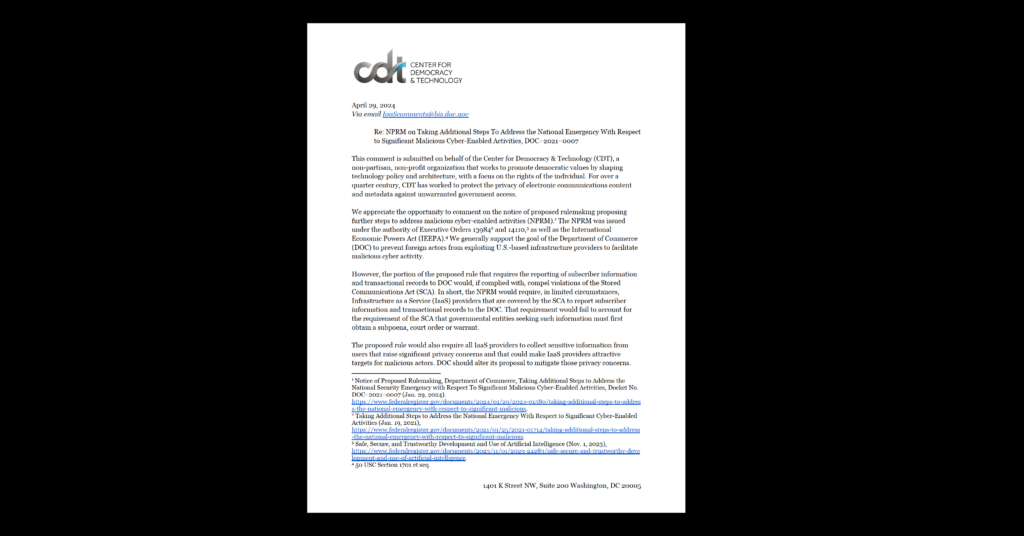CDT Endorses Senator Casey’s Bills on Harmful Workplace Technologies
On the day that we celebrate our nation’s workers, the Center for Democracy & Technology (CDT) is proud to announce its support for three bills that Sen. Robert Casey (D-PA) introduced in the Senate this year: the Stop Spying Bosses Act (“SSBA,” S. 262), co-sponsored by Sens. Brian Schatz (D-HI) and Cory Booker (D-NJ); the Exploitative Workplace Surveillance and Technologies Task Force Act (“Task Force Act,” S. 2440), also co-sponsored by Schatz and Booker; and the No Robot Bosses Act (“NRBA,” S. 2419), co-sponsored by Schatz.
Stop Spying Bosses Act (S. 262)
The SSBA is a broad anti-bossware bill that would impose limits on electronic surveillance of workers, requiring employers to disclose their surveillance practices and prohibiting surveillance that would cause many types of harm to workers. If passed, it would be the strongest workplace surveillance bill yet seen at the federal level. It would impose hard limits on harmful uses of bossware, moving beyond the weak notice-and-consent requirements that underpin many data privacy bills.
The SSBA would prohibit employers from surveilling workers engaged in union or protected labor activity, collecting health or disability data, using an automated system to predict non-job-related behavior, or monitoring workers while they are off-duty. It also prohibits companies from using workplace surveillance in a manner that “threatens the mental or physical health” of the worker and from “selling or licensing” data collected on a worker to third parties. Additionally, it would help close the information gap between employers and workers by requiring companies to disclose key aspects of their surveillance and data collection practices.
No Robot Bosses Act (S. 2419)
The NRBA is the first federal bill that specifically targets harmful uses of automated employment decision tools, which the NRBA refers to as “Automated Decision Systems” (ADS). Such tools were the primary subject of the Civil Rights Standards for 21st Century Employment Selection Procedures (Civil Rights Standards), which a coalition of organizations led by CDT published late last year. If enacted, the NRBA would significantly advance the principles of the Civil Rights Standards by:
- Requiring employers to disclose their use of ADS-driven decisions to workers and explain how systems operate, including descriptions of what the ADS purports to measure, how it measures them, and how the characteristics relate to the functions of the job;
- Imposing robust auditing requirements on ADS, including bias and discrimination testing;
- Establishing mechanisms to help workers vindicate their rights under the law, including a right to appeal ADS decisions and a private right of action for violations of the law;
The NRBA would make significant progress toward reining in the freewheeling market of employment decision technologies, which increasingly determine the course of workers’ careers despite little transparency and deep concerns about such tools’ validity and fairness. CDT hopes the NRBA becomes the model for legislation at both the state and federal levels going forward and serves as an important counter to the flawed NYC law on automated employment tools that went into force this year.
Exploitative Workplace Surveillance and Technologies Task Force Act (S. 2440)
The final bill would establish a task force to examine workplace surveillance practices and gather information on employers’ use of bossware. The main purpose of the Task Force would be to study the use of workplace surveillance by employers, including evaluating the prevalence of workplace surveillance; data collection, use, and storing practices; and the impact of workplace surveillance on everything from worker compensation to performance reviews, career advancement, workplace safety (including both physical and mental health), and more. The Task Force would publish multiple reports analyzing and drawing attention to companies’ rising use of bossware and the harm such systems can cause. These functions would be carried out by a broad group of executive branch representatives who would bring with them a wide range of perspectives and expertise.
Conclusion and Next Steps
Casey’s bills would represent significant positive steps toward the regulation of emerging workplace technologies and practices that are harming workers every day. There are ways in which the bills could be improved: For example, the SSBA should require pre-surveillance notice to workers and include stronger data minimization requirements; and the NRBA should be expanded to cover targeted job advertisements (an increasingly central step in companies’ employment selection process). The Task Force Act should ensure that ordinary workers are represented on the task force it would create. But these amendments would improve already-strong bills and they can easily be addressed during the legislative process.
We hope to see the Senate take up all three bills in earnest, and urge both the Biden Administration and state and local policymakers to look to the substance of these bills as models for regulating bossware and automated employment decision tools going forward.


